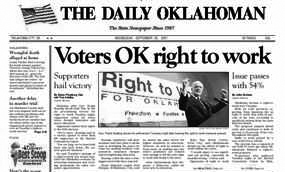Heritage Foundation: Right to Work Creates Jobs and Choice
James Sherk of the Heritage Foundation confirms what we have known for decades, enacting Right to Work laws create jobs and promote choice for workers: Union contracts frequently require employees to pay union dues or lose their jobs. This forces workers to support the union financially even if the union contract harms them or they oppose the union’s agenda. Several states, including New Hampshire and Indiana, are considering right-to-work laws, which protect workers from being fired for not paying union dues. Unions oppose these laws because they reduce union membership and income. However, the rest of the economy benefits from right-to-work laws. States can and should reduce unemployment by becoming right-to-work states. Right-to-Work Unions often negotiate contracts requiring all workers to pay union dues or lose their jobs, whether or not they support the union. But many workers reject unions. Some do so because union contracts reduce their pay. Others oppose unions’ political agendas: Unions almost exclusively support Democrats, despite 37 percent of their members voting Republican in the last election.[1] To prevent workers from being forced to support unions financially, 22 states have passed right-to-work laws. Such laws prevent companies from firing workers who do not pay union dues. Workers may still pay voluntarily, but unions cannot threaten their jobs if they do not join. Lawmakers in several states, including New Hampshire, Indiana, and Michigan, are considering right-to-work bills. Forced Unionization Is Not an American Value The government should not force workers to pay for unwanted union representation. In a free society, workers alone should make that choice. Right-to-work laws also make good economic sense. They reduce the incentive for union organizers to target companies that treat their workers well. Since unions hurt businesses, less aggressive union organizing attracts investment—and jobs. Lawmakers considering right-to-work proposals should ignore the union movement’s self-interested opposition. Unions could negotiate contracts that apply only to their members—they simply prefer not to. Unions should not be able to force workers to choose between financially supporting them and losing their jobs. Unions Lose Money When Workers Opt Out



